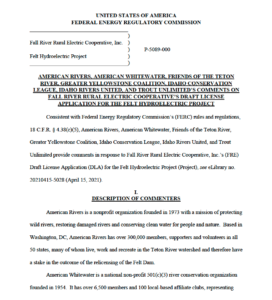Regional Conservation Groups Resolve Litigation Over Water Quality Impacts Caused by the Hells Canyon Complex
For Immediate Release
September 2, 2021
Media Contacts: Greg Haller, Pacific Rivers: greg@pacificrivers.org and (208) 790-4105
Nic Nelson, Idaho Rivers United: nic@idahorivers.org and (208) 343-7481
Regional Conservation Groups Resolve Litigation Over Water Quality Impacts Caused by the Hells Canyon Complex
The settlement forces the state of Oregon to develop a plan to limit dangerous methylmercury pollution and accelerate critical remediation of water temperature impacts at the Hells Canyon Complex on the Snake River.
(Portland, OR) Idaho Rivers United, Pacific Rivers and the State of Oregon signed a settlement agreement that resolves litigation over persistent water pollution and temperature impacts caused by the three-dam Hells Canyon Complex on the Snake River. The dams are owned by Idaho Power Company. This settlement represents one of many steps needed to address water quality, human health, and salmon recovery in the Snake River Basin.
The two conservation groups, represented by attorneys from Gonzaga University Legal Services in Spokane, brought their claims under the authority of Section 401 of the Clean Water Act, which addresses water quality at projects requiring a license from the Federal Energy Regulatory Commission (FERC) to operate. The case was brought against the Oregon Department of Environmental Quality to ensure the agency would require Idaho Power Company to meet its obligations to state water quality standards at the dams. The Nez Perce Tribe, which filed a separate appeal concerning these same issues, also signed the settlement agreement.
Water quality in the Snake River has been severely degraded from high levels of nutrient runoff from agricultural lands in the upper portion of the basin. The warm, nutrient-rich water flows into the reservoir impounded by Brownlee Dam, the largest and furthest upstream of the three dams. As these nutrients decay in the reservoir, methylmercury (a type of toxic, organic mercury) is formed and moves up the food chain, accumulating in the bodies of resident fish species, posing a serious health threat to anyone consuming them. The settlement will require Oregon and Idaho Power to each invest three quarters of a million dollars to develop a plan to limit the amount of methylmercury in the impoundments, and subsequently sent downstream, of the Hells Canyon Complex. Under the agreement, this work must be completed by 2023.
The Hells Canyon Complex was built without fish passage, which eliminated access to the primary spawning grounds of Fall Chinook, and other native species that once filled southern 2 Idaho and spawned as far upstream as northern Nevada. The Complex has also negatively impacted water temperatures in the Snake River since the massive dams were completed in the 1960s. Because of how the dams are operated, the downstream flows are substantially warmer in the fall, and colder in the spring, than they would have naturally been before the dams were built.
Water temperatures have critical implications for salmon, especially Fall Chinook, and other natives species downstream of the Project. High water temperatures become lethal to salmonids during particularly hot summers like the region has experienced in 2021. The settlement accelerates the required temperature monitoring and implements a temperature threshold that cannot be exceeded two years in a row without automatically requiring new infrastructure investments and dam operations to limit harmful water temperatures during key salmon spawning and migration seasons.
Greg Haller, Executive Director of Pacific Rivers: “As a result of this litigation, water quality will improve in the Snake River much sooner than it would have otherwise. The Hells Canyon Complex has significant impacts on Snake River salmon and steelhead and these water temperature improvements are a critical step forward for the watershed.”
Nic Nelson, Executive Director of Idaho Rivers United: “The Snake River has been dubbed America’s Most Endangered River, and this settlement will help to alleviate pollutant issues through arguably the most iconic stretch of this great river. While much still needs to be addressed upstream, this will provide an important framework for tackling pollutant issues throughout the entire Snake River system.”
Rick Eichstaedt, Attorney for Gonzaga University Legal Services: “This settlement creates a concrete plan to address significant water quality issues impacting salmon and steelhead survival in the Snake River. While nothing can fully mitigate the impacts of these dams, the terms of this settlement will help ensure that the long-term operations of the three dams in Hells Canyon will be partially mitigated by addressing temperature and methylmercury impacts.”
/ / / / / /
Idaho Rivers United is a nonprofit organization based in Boise, Idaho. Our mission is to protect and restore the rivers and fisheries of Idaho. Our focus is the ecological integrity of our rivers, but the lens we look through is citizen involvement. To learn more about our work, please visit www.idahorivers.org or contact us at info@idahorivers.org or (208) 343-7481.
Pacific Rivers is a nonprofit organization based in Portland, Oregon. Our mission is to protect and restore the watershed ecosystems of the West to ensure river health, biodiversity, and clean water for present and future generations. To learn more about our work, please visit www.pacificrivers.org or contact us at info@pacificrivers.org or (503) 228 – 3555.


